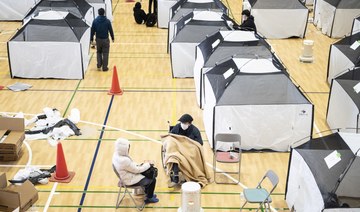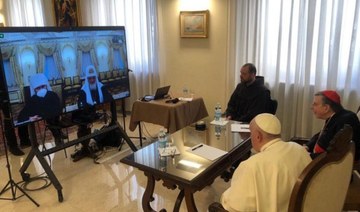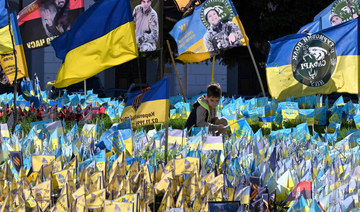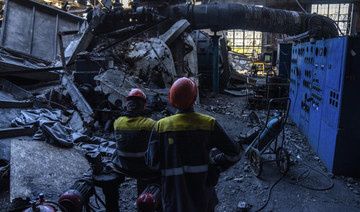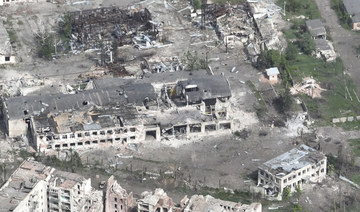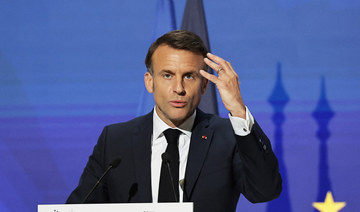TOKYO: Japanese Emperor Naruhito’s only daughter, Princess Aiko, said she is heartbroken by the loss of many lives in Ukraine during her first solo news conference Thursday as an adult royal member.
“I feel extremely heartbroken by the loss of many precious lives in Ukraine,” Aiko said, responding to a question about Russia’s invasion.
Quoting her father’s birthday remark in February, Aiko said she hoped exchanges between people will overcome national and regional borders and lead to a peaceful world where people tolerate differences.
“I strongly believe in peace,” she added, noting her visit to Hiroshima as a junior high school student when she felt strongly about the importance of peace after seeing the horrendous scenes of the Aug. 6, 1945, atomic bombing at the peace museum.
While growing up, she said her grandfather Emperor Emeritus Akihito, who abdicated three years ago, often told her what royal duties are about: stay close to the people — a lesson also followed by his son Naruhito.
“I believe that it is most important as a royal member to fulfil our duty while praying for the people’s happiness and share joy and sorrow,” Aiko said during her first news conference since reaching adulthood at age 20 on Dec. 1.
Her grandfather, the son of controversial late Emperor Hirohito under whose name Japan fought the World War II, devoted his career to promote peace. He won the hearts of many by reaching out to those discriminated against and victims of disasters with the help of his wife, Michiko, a first commoner to marry an emperor.
Aiko said her thoughts go to residents in disaster-hit areas, including those still recovering from the deadly March 2011 earthquake and tsunami in Fukushima prefecture. On Wednesday, four people died in a 7.4 magnitude quake that struck the region again.
Aiko is the only child of Naruhito and Empress Masako, a Harvard-educated former diplomat. She is currently studying Japanese literature at Gakushuin University.
Soon after giving birth, Masako developed a stress-induced mental condition, which she is still recovering from, apparently because of criticism for not producing a male heir.
Aiko on Thursday thanked Masako for “giving birth to me.”
Under the current law, Aiko is not eligible to ascend to the Chrysanthemum Throne. She also has to leave her family if she marries a commoner. Aiko said marriage still seems a distant future.
The 1947 Imperial House Law, which largely preserves pre-war family values, only allows male-line succession and forces female royal members marrying commoners to lose their royal status.
A government-commissioned panel of experts submitted a report to Prime Minister Fumio Kishida in December proposing ways to maintain potential successors without changing Japan’s male-only imperial succession system, which is putting the shrinking family on the verge of extinction.
Recent media surveys showed 80 percent of the public support female emperors.
The panel avoided discussing whether to allow female emperors, and suggested restoring now-defunct royal households to adopt male descendants as potential heirs. It proposed a possibility of allowing female members to retain their royal status after marrying commoners — a less controversial step.
The steadily shrinking royal membership is down to 17. Naruhito has only two possible successors — his younger brother Akishino and his teenage son, Hisahito, the only underage member of the graying royal family.
Japan princess says lives lost in Ukraine breaks her heart
https://arab.news/84xnc
Japan princess says lives lost in Ukraine breaks her heart
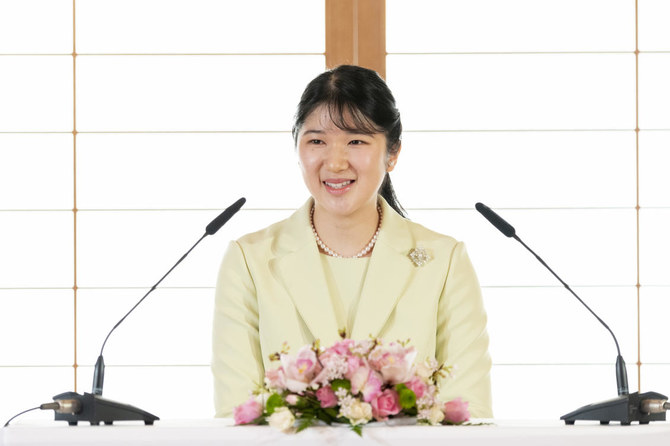
- “I feel extremely heartbroken by the loss of many precious lives in Ukraine,” Aiko said
- While growing up, she said her grandfather Emperor Emeritus Akihito often told her what royal duties are about: stay close to the people
Russia’s FSB says it killed saboteur recruited by Ukraine

- The man was a Russian national recruited by Ukraine’s military intelligence to carry out the attack in the Leningrad region
- He had entered Russia from Lithuania in March after receiving training there
MOSCOW: Russia’s FSB state security service said on Friday its officers had killed a saboteur who had been recruited by Ukraine and was planning to attack a fuel terminal in northwestern Russia with explosives.
The FSB said in a statement the man was a Russian national recruited by Ukraine’s military intelligence to carry out the attack in the Leningrad region, and that he had been killed after shooting at security agents.
The FSB said he had entered Russia from Lithuania in March after receiving training there.
Vilmantas Vitkauskas, Head of the Lithuanian National Crisis Management Center, denied the allegation.
“Russia has been systematically conducting disinformation campaigns and provocations for a long time in order to raise tensions among societies and allies and to cover its aggressive actions,” he said.
“This disinformation spread by the FSB is a case in point. One of the objectives of such aggressive activities is to influence Lithuania’s support for Ukraine.”
There was no immediate comment by Ukraine, were Russian forces are waging war after Moscow’s full-scale invasion in February 2022.
Little hope of Ukraine breakthrough during Xi France visit: observers

- “France and the European Union expect him to use his influence on Russia, but Xi Jinping has nothing to offer on Ukraine,” said a former European diplomat
- Xi is due to make a state visit to France on Monday and Tuesday
PARIS: French President Emmanuel Macron will next week make a new push to try and dissuade China’s Xi Jinping from supporting Russian President Vladimir Putin’s war against Ukraine but is unlikely to make a breakthrough on ending the conflict during the visit, observers say.
President Xi’s visit is set to be rich on symbolism — with a sumptuous dinner at the Elysee Palace and a trip to the Pyrenees mountains planned — but risks being short on diplomatic success for the French leader.
“France and the European Union expect him to use his influence on Russia, but Xi Jinping has nothing to offer on Ukraine,” said a former European diplomat, asking not to be named.
Xi is due to make a state visit to France on Monday and Tuesday, followed by visits to Serbia and Hungary, two European countries retaining warm ties with Russia.
While Xi and Macron will discuss international crises, trade, climate change and cultural exchanges, the key aim will be to “point out that for Europe, the first issue with China is its position on Ukraine,” said a source close to the French government.
On a visit to China in 2023, Macron had already called on Xi to “bring Russia to its senses” over Ukraine and urged him not to deliver weapons to Moscow.
Little has changed, however. Xi will host Putin for talks in China later this month.
Macron, 46, indicated he had not given up on the idea of trying to get Xi, 70, on his side.
“It’s not in China’s interest today to have a Russia that destabilizes the international order,” the French president said in an interview with The Economist published on Thursday. “We need to work with China to build peace.”
European Commission President Ursula von der Leyen, who has urged Beijing to play a greater role in ending the Ukraine war, will join Macron and Xi for talks on Monday.
Macron has said he will ask the Chinese president to help him achieve that aim when he visits Paris, which is preparing to host the Olympic Games this summer.
There is a historic tradition that peace should reign during the Olympics — although the opening of the Games in Beijing in August 2008 did not halt Russia’s invasion of Georgia.
“On Ukraine, China has done nothing,” said Marc Julienne, director of the Center for Asian Studies at the French Institute of International Relations (IFRI).
In February 2023, China published a 12-point position paper on Ukraine, but it was rejected by Kyiv and its Western allies.
Beijing, which says it is a neutral party in the Ukraine conflict, has been criticized for refusing to condemn Moscow for its offensive.
The United States had accused China of helping Russia carry out its biggest militarization since Soviet times.
US officials say China has provided dual-use supplies that have let Russia regroup in the face of a long delay in US aid to Ukraine.
In April, US Secretary of State Antony Blinken said this included “machine tools, semiconductors, other dual-use items that have helped Russia rebuild the defense industrial base that sanctions and export controls had done so much to degrade.”
China has rejected the US claims as “groundless accusations.”
Macron, too, is expected to raise “concerns” about “the activity of certain Wuhan companies that could be directly involved in or contribute significantly to the Russian war effort,” according to a member of his team.
Beijing is a major supporter of the Russian economy.
China-Russia trade in 2023 reached a record $240 billion, according to customs data, overshooting a goal of $200 billion set by the neighbors.
Experts say Beijing is unlikely to renounce support for Moscow, which it sees as a priority partner in its opposition to the United States.
“Xi Jinping’s priority is the Global South,” said Emmanuel Lincot, a China expert at the Catholic University of Paris.
“There is a congruence in the Sino-Russian bilateral relationship, particularly in the desire to counter the West. Which is not to say that there is no rivalry.”
Human rights group begins legal action over UK’s Rwanda migrant policy

- The group said the government’s Safety of Rwanda policy document was inconsistent with the new law
LONDON: Human rights group Asylum Aid said on Friday it had launched a legal challenge to the British government’s policy of sending asylum seekers to Rwanda in the wake of a new law which seeks to pave the way for the scheme to be put into operation.
The group said the government’s Safety of Rwanda policy document, published on April 29, was inconsistent with the new law which was passed by parliament last month to override a ruling by the UK Supreme Court that the scheme was unlawful.
Britain sanctions Israeli groups, individuals for violence in West Bank

- The four individuals sanctioned were responsible for human rights abuses against Palestinian communities in the West Bank
LONDON: Britain on Friday imposed sanctions on two “extremist” groups and four individuals in Israel who it blamed for violence in the West Bank, its latest package of measures against Israeli settlers.
Britain’s Foreign Office named Hilltop Youth and Lehava as two groups which it said were known to have supported, incited and promoted violence against Palestinian communities in the West Bank.
The four individuals sanctioned were responsible for human rights abuses against these communities, the statement added.
Among them are Noam Federman, who has trained settler groups in committing violence and Elisha Yered, who has justified killing Palestinians on religious grounds.
Violence in the West Bank was already on the rise before Israel’s assault on Gaza, which was triggered by an Oct. 7 Hamas-led attack on southern Israel.
It has escalated since, with stepped-up Israeli military raids, settler violence and Palestinian street attacks.
British foreign minister David Cameron said extremist settlers were undermining security and stability and threatening the prospects for peace.
“The Israeli authorities must clamp down on those responsible. The UK will not hesitate to take further action if needed, including through further sanctions,” he said.
Those sanctioned will be subject to financial and travel restrictions. Britain previously imposed sanctions on four Israeli nationals in February.
Universities take steps to prevent pro-Palestinian protest disruptions of graduation ceremonies
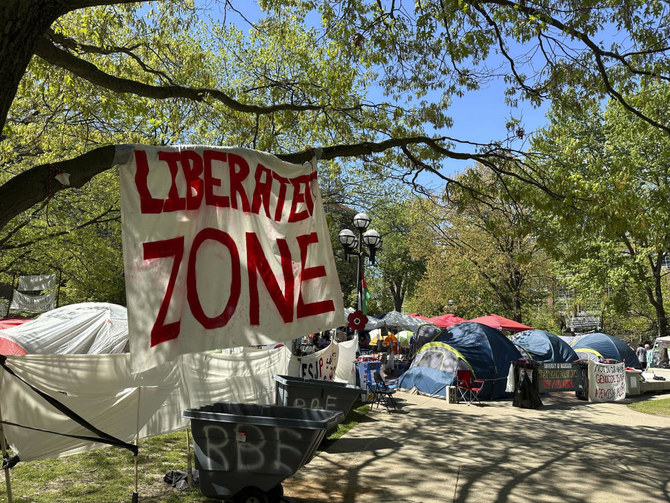
- Students booed and yelled “free Palestine” while the University of Utah president spoke Thursday night at commencement
- “People can exercise their First Amendment rights without disrupting or creating fear,” Burdick said of protesters
MICHIGAN, USA: With student protests over the Israel-Hamas war disrupting campuses nationwide, several major universities are intent on ensuring that commencement ceremonies — joyous milestones for graduates, their families and friends — go off without a hitch this weekend.
It won’t be easy. Colleges are hiring extra security, screening attendees at venues and emphasizing that significant disruptions by pro-Palestinian protesters won’t be tolerated. At the same time, they’re pledging to honor free-speech rights by designating protest zones.
Students booed and yelled “free Palestine” while the University of Utah president spoke Thursday night at commencement. He paused his speech to ask those who were protesting to leave or be removed. Outside the ceremony in Salt Lake City, a group of about 50 people were rallying. There was one arrest.
“Milestone is a perfect word,” said Ken Burdick of Tampa, Florida, describing his daughter’s graduation Saturday at the University of Michigan. He hopes the big day goes untarnished.
“People can exercise their First Amendment rights without disrupting or creating fear,” Burdick said of protesters.
Here’s how some schools are planning to balance things:
UNIVERSITY OF MICHIGAN
More than 8,000 graduates — and 63,000 spectators — are expected for Saturday’s festivities inside Michigan Stadium, known as The Big House. There will be security screening, and disruptive protesters could be subject to removal. Public safety officers and staff who commonly monitor major events, such as fall football games, will be present. Author and historian Brad Meltzer is the featured speaker.
In March, an annual event recognizing students with high academic achievement ended early when pro-Palestinian protesters raised provocative signs and drowned out remarks by President Santa Ono, yelling, “You are funding genocide!” The university subsequently drafted a policy that could lead to student expulsions and staff dismissals for event disruptions, though it hasn’t been finalized.
“It was painful for everyone who had gathered — and especially so for members of our Jewish community,” Ono said two days later.
Protesters have erected dozens of tents on the Diag, a historic space for campus activism more than a mile away from the stadium. They’re demanding that Michigan cut financial ties with companies connected to Israel. There has been no effort to break up the encampment and no arrests.
“We respect and uphold the principles of free expression, and also recognize that no one is entitled to disrupt university activities,” Laurie McCauley, Michigan’s chief academic officer, said in an email to students and staff about commencement.
Blake Richards, 25, is earning a bachelor’s degree in biochemistry. Richards plans to be at the football stadium Saturday after participating in a smaller ceremony Thursday for chemistry students.
“It could take away some great feelings, muddle them,” Richards said of any disruptions. “But truth be told, I’m not bothered. I know others have different opinions; I’m just happy to be here.”
INDIANA UNIVERSITY
The Bloomington, Indiana, campus is designating protest zones outside Skjodt Assembly Hall and Memorial Stadium, where ceremonies will be held Friday for graduate students and Saturday for undergraduates. Nearly 10,000 students are eligible to attend.
A social media post circulating on Instagram urged protesters to wear “your keffiyeh along with your cap and gown” and walk out during Saturday’s remarks by President Pamela Whitten.
Roughly 20 tents set up by protesters remained in place this week in an area known as Dunn Meadow, a mile from the stadium. Dozens of protesters have been arrested there recently, according to the Indiana Daily Student.
Maya Wasserman, a 22-year-old senior in management who is Jewish, said she and her family feel uncomfortable about the prospect of pro-Palestinian protests disrupting commencement. She expressed special concern for her mother and grandmother, who are Israeli.
“It’s unfortunate because we want this event to be about graduating, not politics,” Wasserman said.
At Dunn Meadow, students in lawn chairs or on blankets worked on their final assignments. Jessica Missey, a 20-year-old protester and senior, said she boycotted final exams; some professors, she said, simply canceled them. She has enjoyed the camaraderie at the encampment.
“Commencement is kind of just taking almost a little sidestep for me,” said Missey.
NORTHEASTERN UNIVERSITY
A week after police arrested nearly 100 protesters at Northeastern University, the school is holding its commencement exercises Sunday at Fenway Park, home of the Boston Red Sox, for the fourth consecutive year.
The venue will help security officials monitor the crowd and limit what people can bring. Signs, banners, balloons and full-size flags are prohibited in the stadium, along with most bags. Renata Nyul, vice president for communications, said public safety staffing will be strengthened.
All those entering Fenway will need to pass through metal detectors. About 50,000 graduates, family and friends are expected.
Northeastern is one of several universities in the Boston area that have had pro-Palestinian encampments. Some have let the protests continue, though Northeastern’s camp was broken up.
“While we realize that issues in the world prompt passionate viewpoints, the focus this weekend should be on our graduates and their remarkable achievements,” Nyul said.



